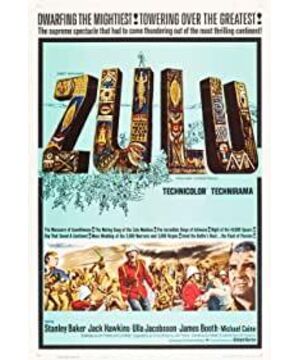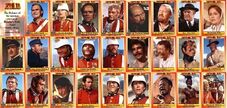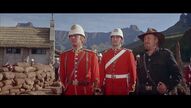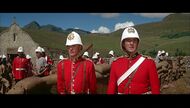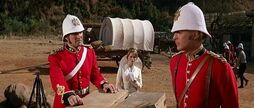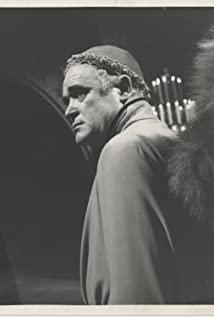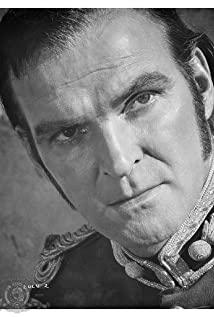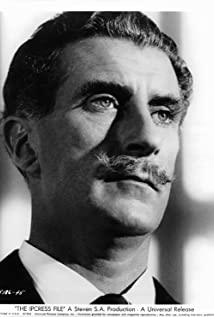As an old film shot in the 1960s, "Zulu" has reached the first-class level of contemporary movies in all aspects, especially the series of battle scenes shown in the film, such as the offensive and defensive battles of the two sides, which are even more impressive. , Can be called the immortal classic in the war film.
At the beginning of the film, the scene of the British army's defeat in Isandrwana was reproduced in a panoramic view. The corpse in the red uniform fell to the ground. The Zulu stepped on the corpse, checked their bullet belts, and took away rifles and other trophies. . At the same time, the Swedish missionary Wade and his daughter attended a collective wedding in a Zulu tribe. During the event, they were shocked to learn that the battle had begun and fled to their mission point at Oscar Fort at Rock Ferry. A bloody battle inevitably descended on the head of this ruined little church.
Zulu fighting power
Although the social form of the Zulu people is still at the stage of clan communes, they are by no means brave barbarians. On the contrary, in daily hunting activities and years of tribal wars, the Zulu people have accumulated a wealth of combat experience. Although its army is primitively equipped, its command and coordination are well-organized, its actions are agile, and it possesses amazing courage and sacrifice. The battle has not yet begun, the film has made a lot of preparations for the combat effectiveness of the Zulu people, for example, through the mouth of Boer Lieutenant Yardendorf, described the Zulu people’s "bull head formation" tactics-the two wings are "horns", the center For the "Bull Head" and "Bull Waist", the tactics of outflanking the two wings first rounded off the enemy's flanks, cutting off their retreat, and then the central column composed of many ranks carried out a frontal assault to defeat the enemy. In the film, Lieutenant Bronheide ridiculed this tactic as "too simple", but as Yadendorf said, this tactic "should be said to be very deadly"-you know, the British of Isandrwana Under the attack of this kind of tactics, the army's defense line fell apart and suffered a disaster. In addition, the film also reveals the amazing battlefield mobility of the Zulu through the mouth of a Swiss Mounted Police, at least 50 miles (approximately 80 kilometers) on foot in a day, and can go into battle without taking a break. In contrast, British infantry can only advance 20 miles a day. With such an amazing speed, it is no wonder that most of the Olympic track and field gold medals have been won by black athletes all the year round.
The arrangement of the Zulu people entering the battlefield is amazing. First, there was a rumbling roar from a distance. According to Lieutenant Bronhead, it was like a "damn train." In fact, this was the loud noise of Zulu beating on their shields. At this time, although the British army could not see them yet, Already horrified; after the hustle and bustle, the Zulu suddenly calmed down. At this time, the British troops were both panicked and puzzled. They couldn't figure out what the other party was doing, and they couldn't even judge the direction. When they reacted, the Zulus were already forming a formation on the hills around the battlefield, and they let out a deafening roar. Their cowhide shields and spears gave out dazzling white light in the sun.
In the ensuing battle, the Zulu people showed their courage and strategy. Unlike the barbarians rushing in swarms in some movies, the Zulus lined up their troops in several battle lines, first sent a small group of people to do a tentative attack, and rushed to the southern positions of the British army. Carrying out an assault, but shouting on the spot, attracting British troops to shoot. After paying the price of dozens of casualties, the Zulu retreated. At this time, the British army was a little proud, but the experienced Boer Lieutenant Yardendorf awakened the dreamer: The Zulus used the lives of their soldiers to judge the intensity of the British army’s firepower through gunshots. Calculating the number and deployment of British troops, this tactic really surprised the British officers and soldiers.
After understanding the reality of the British army, the Zulu quickly launched a massive offensive with the classic "Bull Horn Formation". The southern wing troops bluffed and attacked the west, attracting the attention of the British army. Unlike the previous wave of attacks, this time all the Zulus crawled in the grass when the British opened fire, and none of them were hit. At the same time, on the hillside of the north wing, hundreds of Zulu shooters fired at the British positions. The Zulu people have many muskets and rifles, perhaps as many as 15,000, but fewer than 2,000 guns have high accuracy. Maybe it's not long since they have been in contact with firearms, their marksmanship is very poor, and they are far less comfortable than tender guns. It is said that the Zulu throwing javelin has a range of 70 yards (about 64 meters), which is an amazing distance. In contrast, the range of the Romans to throw heavy javelins was only 30-40 meters.
Under the cover of the gunmen, the Zulus launched a main attack on the north wing. Hundreds of soldiers braved the bullet rain, following one after another, rushing to the British fortress with a decisive attitude. The simple fortifications hurriedly built by the British with sandbags and carts did not play a big role. The Zulus quickly rushed to the low parapet. Some even climbed over the obstacles and started a hand-to-hand fight with the British army. The Zulus used large shields and short javelins to fight, and they had an advantage in close-range assassinations and defenses, which was somewhat similar to the Roman Legion. The British rifle and bayonet combat tactics are relatively clumsy. Just like their ancestors, the Saxon barbarians used all their strength like wild boars, but they were emptied under their ribs and repeatedly hit, resulting in quite a few casualties. big. Even the commander, Lieutenant Chad, was involved in hand-to-hand combat and was injured in the first Zulu attack and almost died.
Perhaps the Zulus are not good at gunfights and are afraid of shooting their own people. The Zulu attacks on the North Wing did not last long before they retreated. However, shortly after the offensive on the north wing stopped, the Zulu formation suddenly appeared on the south wing, and immediately launched a second wave of offensive. The continuous attacks put tremendous pressure on the understaffed British army, so that the ancestors The Lu people once broke into the church building and on the roof, and every room became a battlefield. Despite the desperate resistance of the British army, the Zulu people evacuated the battlefield at the cost of 350 killed, but their extraordinary strategy and undaunted spirit were enough to make the British feel terrified and force them to re-recognize this tenacious nation. .
The spirit of the
British Although the British army eventually won the war, for the 104 hapless British soldiers trapped in the Rock Ferry, January 22, 1879 was still a life-and-death moment. The British troops in Isandrwana to the south have been wiped out, and the isolated Rock Ferry and the poor defensive forces were immediately exposed to the attacking spears of the 4000 berserkers on the right wing of the Zulu army. Under the crisis, Lieutenant Chad and a gentleman of the Royal Engineers were born, and the seemingly frivolous Lieutenant Bronhead became a man who turned the tide. These two people are of different origins and temperaments. But at a critical juncture, the two men worked in the same boat and played the role of a mainstay. With more than 100 residual soldiers, they withstood a continuous 12-hour violent attack by an enemy 40 times their own, creating a miracle. There are three reasons why the British army can be outnumbered by the enemy: one is the absolute advantage of weapons and equipment; the second is the defensive advantage of waiting for work, and the third is the support of the British spirit.
Weapons and equipment have an absolute advantage. This is the most powerful and direct factor for Western countries to finally conquer the Eastern world. The Martini-Henry MKII breech rifle equipped by the British army in this battle was the most advanced rifle in the world at that time, with a limit rate of fire of 20 rounds per minute. Because the barrel was engraved with rifling, its shooting accuracy exceeded that of the same period. Other rifles. In the film, the British army was able to suppress the Zulu gunners, and at the critical moment when the Zulus broke through the outer defenses, they beat their opponents with three rows of corpses. Martini-Henry MKII contributed a lot. In addition, this rifle is equipped with a standard bayonet length of 552mm, with a ring seat, mounted on the right side of the muzzle, which also allows the British army to deal with the dangerous short spears of the Zulu in close hand-to-hand combat. During the war, the British army was also equipped with advanced weapons such as early Gatling machine guns and field guns. In addition, the British army also had the advantage of cavalry. In the decisive battle of Wulongdi Village, the British army’s fast-fire breech guns and field guns organized a dense firepower network, completely preventing the Zulu from close-range charges and launched The cavalry attack completely defeated the main force of the Zulu, and then won the war.
Another important factor in the victory of the British army in this battle was that they established a simple but effective defensive circle in advance, able to wait for work and thwart the ferocious assault of the Zulu. Lieutenant Chad contributed a lot to this, and his professionalism in the Royal Engineers came in handy.
Although the film is not ugly to the Zulu people, it is still superficial, but it is extremely successful in portraying the British. The so-called "British spirit" has also been vividly manifested in this small offensive and defensive battle. Let me talk about the two commanders first. Lieutenant Chad, who was born as a civilian, represents the character that a soldier from his class should have-he is usually conscientious and obscured, he has the courage to take responsibility at critical moments, and he is good at uniting his subordinates. Popular hope. Lieutenant Bronhead, known as a "gentleman," abides by the officer's privileges of not performing hard work. He is full of food all day long and has nothing to do. During the war, he is still keen on hunting and other boring pastimes. He usually likes to say some yin and yang strange things, and curse people without dirty words. . This is also a necessary education for English gentlemen, usually called a sense of humor. The two people are born with very different temperaments, and it is inevitable that they have some "arrogance and prejudice". However, at the critical moment of the Zulu siege, Lieutenant Chad was so nervous that he couldn't even put the bullet into the barrel. On the contrary, Bronhead commanded Ruojing and came to the line of fire with ease. He even said that in this battle, how I wish I was an ordinary soldier. People shouldn’t show their appearances. Although the upper class in the UK are somewhat pretentious, they lead the way in times of crisis. In the history of this dynasty, the situation of "cold plains and turbidity like mud, and Gaudíliang will be as timid as a chicken" is really rare in the UK. Under the test of the war, Bronhead put aside his arrogance, Lieutenant Chad abandoned his prejudice, worked together in the same boat, and finally passed the difficult time.
All kinds of lower-level officers and soldiers also have distinctive personalities. The sergeant commander has a stern look and absolutely obeys orders; military doctors are in danger, and still have not given up to rescue the wounded under the sword of Zulu; there is also the "antagonism" of Welsh and Zulu in front of the battle. And laughed at the other party "the bass is good, but there is no good tenor." During World War II, Rommel also saw the British generals who were forced to surrender in the Battle of France. "The British officers still maintained a gentlemanly demeanor after surrendering. They did not have the mourning looks of French officers. They talked and laughed in the square and in front of the houses. , I completely forgot that I just finished the battle.” Even if I fail, even if I die, I don’t forget to joke. This optimistic spirit is precisely the unique embodiment of the strong character of the British — I don’t put you in my eyes at all.
At the end of the film, when the morning light shone, there were heavy casualties, but the Zulus, who were fully capable of attacking again, quietly left the battlefield. According to Boer Lieutenant Yardendorf, the Zulus were overcome by the courage of the British defenders before they withdrew voluntarily. If this is the case, the British army is really defeated, and the Zulu chief also has the legacy of Alexander the Great and Saladin. But according to historians, the Zulu offensive deviated from the original plan. They were originally going to stop the British army from breaking down. Therefore, the attack on the Rock Ferry was purely a matter of hand-in-hand. , Leave if you can't beat, and have no determination to attack. There is also a saying that the Zulu people have been fighting for days, insufficient supplies, tired division veterans, and heavy casualties in attacking strongholds. What's more, British reinforcements were also moving towards the Rock Ferry that day, and they had to withdraw their troops for rest and recuperation. In any case, the Zulu people are gone, and their short-lived victories and their kingdoms disappear. In the years to come, the British will become the new masters of this land, and a system called "apartheid" will also be available to all blacks, including Zulus, and other people of color in the next century. Kind of heavy shackles. However, the British will eventually leave this land, and apartheid will also disappear. It is not Martini-Henri MKII, nor the Zulu spear, nor Sir Cecil Rhodes and his crazy dreams, that determine history, but the progress of civilization and the reconstruction of human order, as well as differences. Tolerance and reconciliation among nations.
View more about Zulu reviews


